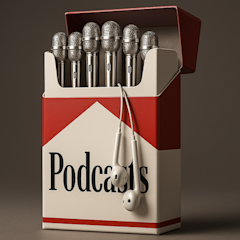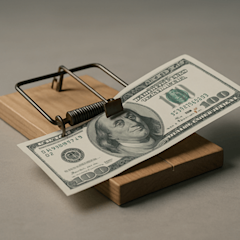Your Brain Is Catfishing You
For most, "settling down” feels like the only path.
That’s what you do: you meet someone, you lock it in, and you pray they don’t figure out you’re actually a lunatic.
Case Kenny—author of The Opposite of Settling—flips that idea on its head. On my podcast, he dropped the heart of his book: don’t settle down.
Settle up.
If you’re not familiar, Case is a writer and podcaster who built a big audience by blending relationships and personal growth.
I asked him what he meant by “settling up”. He gave me a few gold nuggets I won’t forget.
I don’t know who needs to hear my takeaways from this episode (and his book). But, if you’re like me… you’ll probably wish you had them tattooed on your forehead 20 years ago.
(Most people underestimate #2 and are guilty of catfishing themselves (#5).)
1. The Right Relationship Makes You More Independent
Most people assume a relationship means trading freedom for compromise—less travel, less ambition, less of themselves.
So when it’s time to “settle down,” they choose a partner who boxes them in.
Case flipped the script.
He realized that the right person doesn’t clip your wings—they hand you a bigger set. He said he actually feels more independent now that he’s with the right person.
Takeaway: If a relationship feels like it’s closing doors, it’s the wrong one. The right one opens more.
2. You’re More Likable Than You Think
Case cited research on something called the liking gap. After conversations, people underestimate how much others like them.
Translation: you walk out of a coffee date thinking, I was awkward, they probably hate me, when in reality they were impressed.
This also creates a scarcity mindset. We think, Oh no, someone finally likes me, I’d better lock it down before they change their mind.
That’s how people settle.
Takeaway: Trust that you’re more likable than you think. Scarcity leads to bad decisions. Confidence leads to clarity.
3. Weird > Authentic
I hate the word “authentic.”
Nobody knows what it means anymore. Everyone’s performing authenticity.
Case says forget authentic. Be weird. The non-conforming traits you think are too much—the too-loud laugh, the obsession with chess, the job that makes no sense to your parents—those are the magnets.
They repel the wrong people and attract the right ones.
Takeaway: Double down on your weird. It’s not baggage—it’s the filter.
4. Playfulness Is the Point
Relationships aren’t supposed to feel like business partnerships. Case says the real purpose is playfulness. Shared humor. Creating new jokes and memories together.
That one resonates most.
My happiest relationships aren’t the most “stable” or “serious.” They’re the most playful.
Takeaway: If you can’t laugh together, you can’t last together.
5. Your Brain is Catfishing You
Case also talked about the peak-end rule.
Our brains remember relationships by their highest moments and their endings. That’s why you look back and say, “It was all bad” or “It was the best I’ll ever have.”
Both are wrong.
The danger of the peak-end rule is that it traps you in a distorted memory loop. If you decide the whole thing was “all bad,” you carry bitterness into every new relationship, building walls no one can climb. If you decide it was “the best I’ll ever have,” you compare everyone new to a fantasy highlight reel that no real person can match.
And just like falling for a catfish, if you buy into it, you end up chasing ghosts, clinging to nostalgia, or shutting down completely instead of seeing the present for what it is.
Takeaway: Don’t villainize your ex or the chapter you just lived. Appreciate the good memories without letting nostalgia—or bitterness—dictate your future.
Why This Matters
I wish I had this conversation 20 years ago.
Case Kenny’s framework isn’t just for dating. It’s a mindset shift: don’t shrink yourself to fit an expectation.
Expand yourself with someone who sees you, weirdness and all.
That’s why I think everyone should listen to this episode.
Because love isn’t about compromise—it’s about amplification.
Stop settling down. Start settling up.










